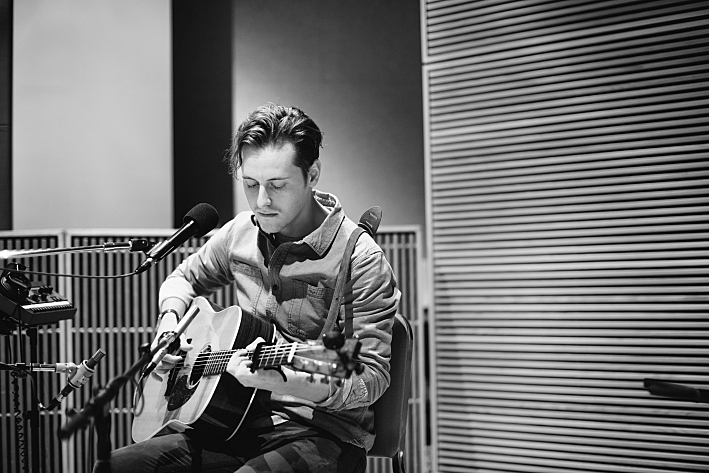But... “Being a musician full-time was the last thing I thought I would do,” Plaine remembers, on the eve of his album release, a folksy, immensely satisfying self-titled debut on Washington Square/Razor & Tie. “I mean, at one point, I was studying for my LSATs to be a lawyer. But as I was writing more songs, I realized I could see myself doing this.”
On his debut, you can hear why Plaine’s plaintive lyrics and calming rasp have earned early praise. His music, at times both unsettling and a comfort, has been hailed as “the soundtrack for nostalgia-drunk road trips.” And his voice: “Like worn flannel and faded jeans.”
His influences are varied: the storytelling of Dylan, of course (“Coming from Minnesota, it’s hard not to be influenced by him....“Boots of Spanish Leather” is one of the first songs I really felt a connection with.”). You’ll be reminded of the breadth and genius of Conor Oberst. Listen closely, and you’ll hear bits of his other childhood heroes: Kurt Cobain, Springsteen, Ryan Adams.
Plaine’s journey from unknown to rising talent started innocuously. He was invited down to Nashville to record a few tunes. No pressure, no expectations. Just him and producer Jordan Schmidt (Quietdrive, Motion City Soundtrack), out to try a few songs.
Somebody caught on early. MasterCard starting featuring his track “Your Love” in a national commercial. Song appearances on the CW shows Hart of Dixie and NBC’s The Biggest Loser followed. Remembers Plaine: “It’s about that time I was like, hey, maybe this is something I should pursue.”
New songs were written. Others took new shapes. Album closer “Beautiful,” for example, is almost orchestral in its reach. “Some songs started differently in my head,” says Plaine. “And that song ended up being a really unique, bigger production when we started working on it.”
Plaine’s debut is certainly diverse: the thumping “Hard Days” is an uptempo, handclapping anthem, while “The Hell If I Go Home” and “Never Come Back Again” embrace beautiful pop harmonies. “Houston” has the breadth of an Arcade Fire song, while “Your Love” is a folksy foot-stomper.
Lyrically, Plaine teeters on the autobiographical, with the singer’s personal life mixing seamlessly with his knack for colorful storytelling. Take “Houston,” for example. “We just started with a chord progression I was working on and two lines: ‘Losing don’t mean nothing when there’s nothing to lose/living isn’t living when I’m missing you,” he explains. He later adds, laughing, “No idea why I chose Houston for that song, except I love Texas”.
When Plaine tours later this year, expect a more stripped-down affair, just a man, his guitar and some stories. “It’s definitely more folky, more Dylan-esque,” he explains. “Sometimes there’s a band, but sometimes it’s just me, my guitar and my harmonica.”
In the end, Plaine is happy with his unexpected new path.
Bringing the sort of picked guitar strings and banjo harmonies that would threaten Mumford and Sons on a good day, Austin Plaine’s self-titled debut is instantly smashing. There has always been an unprecedented honesty and modesty to folk music, and this is no stranger to that rule. With production also from Jordan Schmidt, who has tinkered around for groups such as All Time Low, we should really be in safe hands.
The fact that Plaine has been crafting this album for six years, and is still only the tender age of 23, is rather baffling; his vocal quality boasts accomplishment and triumph, with each of his songs melodic and humble. First single, Never Come Back Again, is a really spectacular piece, packed with warmth and wistfulness, so much so, it largely mimics the class of any Band of Horses number. It’s fairly clear why Plaine picked this to be his initial single; if you can’t glean a few pockets of support from such a quaint piece, then something hasn’t clicked properly.
Hard Days is driven, once again, by a gentle acoustic guitar. This is more unsettling, lyrically, speaking of uncomfortable surroundings and situations. However, it’s Plaine’s gruff tones that separate this from being one of Mumford’s older hits. I think the issue with some tracks such as this is that they are often only enjoyable to hear when you’re in a troubled mood, but Austin Plaine need not strive to create some up-tempo notes; his musings are soft and sultry, but very good indeed. Another great example of Plaine’s subtlety is The Other Side of Town, a mellow offering made up of strings, keys and poetic visions of childhood. The seeming portrayal of being unaware of the growth through adulthood so effortlessly discussed in this track would have lent itself well to a mid-series episode of One Tree Hill; so much so, it’s rather annoying that the TV programme isn’t still in production.
Alas, I digress. One to tap your toes along to is Houston; I guess there must be at least one obligatory cheery track, but this is fun, sweet and possesses a similar cheekiness to many of Vance Joy’s emergent few. The atmosphere does alter slightly, though, when Only Human comes around. This is a really emotional offering, showcasing weakness through such mildly plucked strings. The Cost is sharper, yet adheres to a similar pattern, outlining that this album is going to be fairly slow, but with a delicate optimism, lyrically, with Wait possessing jerky drum beats as accompaniment. The latter is another strong point on the album, because this is just that bit more musically expansive; some of the slower items rely only upon Plaine’s lyrics to project what makes them so superb. The Hell if I Go Home also must be tipped a focal point, too; it fits the mould well, but the echoing female backing vocals add character and this really begins to round the collection off.
So, indeed, this might not be particularly outside the general strings box, but it’s one to hear and appreciate for its intensity and breadth of appeal.




0 comments:
Post a Comment